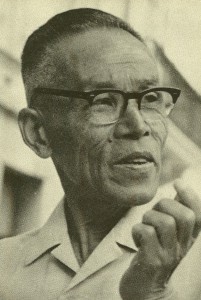
By Edward Esko
George Ohsawa envisioned a new era for humanity: an era of health, peace, and freedom for everyone. With crystal-clear insight, Ohsawa revived, revitalized, and reinterpreted humanity’s universal, traditional cosmology. He made it new, fresh, and accessible to everyone, using any and every opportunity to reveal its simplicity, practicality, and relevance. Contained in his philosophy are many ideas that are now commonly expressed. For example:
- Ohsawa’s teachings about respect for nature and ecological living are the same as those of today’s worldwide environmental movement, including the call to adopt grain- and vegetable-based diets to reverse environmental destruction. Moreover, Ohsawa’s thinking on the economic justice of diet has been echoed in books such as Diet for Small Planet, Diet for A New America, and others in which grain-, vegetable-, and soybean-based diets have been advocated as a solution to world hunger and a fundamental means for preserving scarce natural resources, including tropical rain forests.
- Ohsawa’s emphasis on whole natural foods and his teaching that one’s body and the soil are united in a very real way can now be heard in the organic, natural food, and natural farming movements. The use of pesticides and other chemicals in the production of food is now recognized as a threat to both personal and planetary health, and there is a call for a return to organic methods. Natural and organic foods are no longer restricted to specialized retail stores but are appearing with increasing frequency on supermarket shelves.
- Ohsawa’s belief in the superiority of plant-based diets is now shared by medical scientists and researchers around the globe. This belief is being expressed in official reports, such as the landmark Dietary Goals for the United States, issued by the United States government in 1977. Population studies, such as the China Health Study, point to far lower rates of heart disease, cancer, diabetes, and other chronic diseases among people consuming grain- and vegetable-based diets
- Ohsawa’s introduction of Far Eastern and other traditional healing modalities-including acupuncture, moxibustion, herbal medicine, meditation, visualization, and other mind/body approaches-provided fertile soil for the growth of the holistic, alternative, and natural health movements, and for growing public acceptance of these approaches. In recent surveys, one-third of all Americans were found to be using alternative healing approaches, including macrobiotics. Many physicians, other health-care providers, and the United States National Institutes of Health (NIH) are studying and investigating alternative medicine. Ohsawa’s dream of a synthesis of Eastern and Western medicine may occur sooner than we think.
- Ohsawa’s teaching that eating a balanced diet of whole natural foods can help reverse chronic and acute illness, confirmed by over fifty years of experience, is now being taken seriously by medical science. On the biochemical front, researchers are discovering numerous compounds in grains, beans, sea vegetables, miso and fresh vegetables that inhibit the growth of cancerous tumors. On the clinical front, studies such as those conducted by Dr. Dean Ornish, in which a grain- and vegetable-based diet was found to reverse long-standing coronary blockage, a leading cause of heart attack and stroke, confirm Ohsawa’s faith in the healing power of one’s own body, given the right nourishment.
- The increasing popularity of macrobiotics among persons with cancer along with the publication of documented stories of cancer recovery has led NIH to approve an official study of macrobiotics and cancer. In the near future, a naturally balanced diet along the lines of macrobiotics may become a primary component of the modern health-care system. In addition, Ohsawa’s teaching about personal responsibility for health is gaining increasing acceptance in the fields of public health and preventive medicine.
- Ohsawa’s pioneering discoveries in atomic transmutation along with his application of yin and yang in the world of chemistry and physics helped pave the way for the appearance of an entirely new school of scientific thought. In this new school, all things are seen as interrelated, not separate, and the Cartesian division between mind and body, observer and observed, and humanity and nature is being replaced by a more holistic and unifying paradigm.
- Ohsawa’s vision of a planetary civilization united by a common dream of health, peace, respect for nature, and an intuitive awareness of our origin and destiny as human beings is steadily being realized as his ideas continue to spread across national, racial, ideological, and geographical boundaries. From Sidney to St. Petersburg, Boston to Buenos Aires, Colorado to the Congo, Oroville to Osaka, a growing number of people are pursuing Ohsawa’s ideas.
Edward Esko is a senior macrobiotic teacher, writer, lecturer, author of several books, including “Contemporary Macrobiotics” and many others. This is excerpted from his foreword to “Essential Ohsawa”, published by G.O.M.F.
